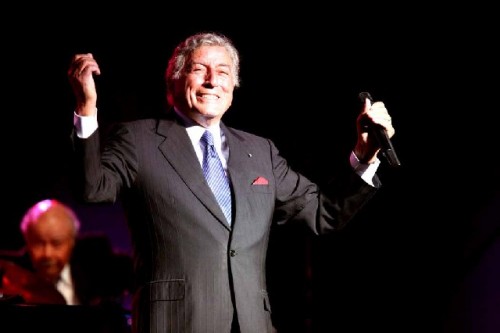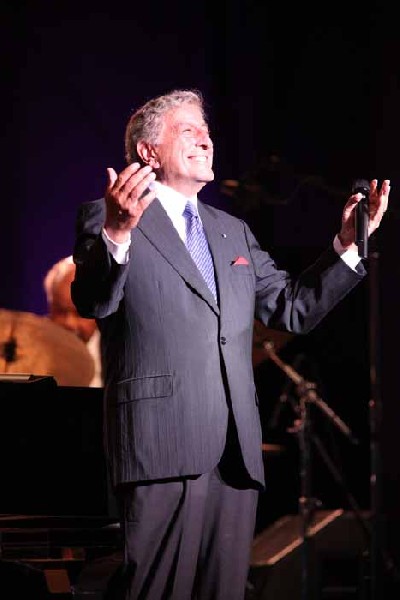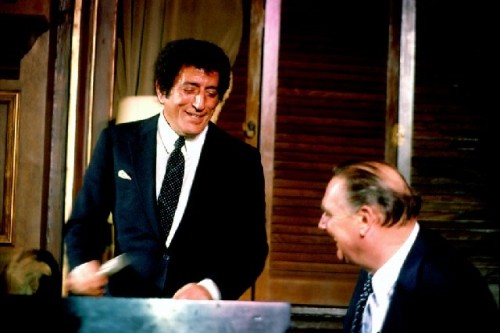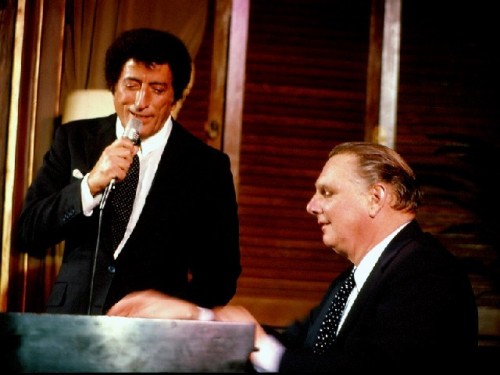Tony Bennett Swings Tanglewood
The Music Never Ends
By: Charles Giuliano - Jul 22, 2009
It was another miserable night during the summer long monsoon. With consummate grace, style and dignity, Tony Bennett, at 83, the last great male jazz vocalist of his generation, greeted the audience at Tanglewood "Thanks for coming out on a rainy night." While the lawn was vacant there was a good attendance in the Shed. On an artistic level it was a rare and wonderful experience. Other than the now annual Labor Day Jazz Festival there are too few opportunities to hear jazz artists on this level at Tanglewood.
The evening opened gracefully with Bennett's daughter, Antonia, singing "Too Marvelous for Words" Cole Porter's "Every Time We Say Goodbye" and the Billie Holiday standard "You're a Lucky Guy" by David Fishberg. She is one of two daughters, born 1974, to Bennett and Sandra Grant. A stunning red head she was dressed in an elegant black gown with an Empire cut black sash and floor length organza. There was a nice inflection and style to her delivery which took full advantage of the quartet. Later Bennett thanked the audience for "Being so nice to my daughter" who joined him on stage for a bow.
More than a survivor Tony Bennett is one of the true originals and masters of American song. Like many in the jazz world there were tough years of neglect, personal, and professional issues. When the Beatles rocked the world in the 1960s it was the death knell for jazz singers like Bennett. Other than Vegas there were no gigs. Recording contracts evaporated. Big Band leader, Stan Kenton, often told me how bitter he felt when his long term label, Capitol Records, dumped him after they signed the Beatles. Stan later reissued the entire Capitol library on his own label Creative World. He dismissed rock as "kid's music."
On those occasions when Bennett found his way into the studio producers forced him to make covers of rock and pop tunes. The results were disasters that pleased nobody least of all the artists. Some jazz artists, like Miles Davis, succeeded by embracing aspects of rock to create the fusion style that resulted in the brilliant 1969 double album "Bitches Brew." Others simply languished with devastating impact on their personal and professional lives.
A turn around came for Bennett in the 1980s. At rock bottom, in 1979, Bennett reached out to his sons Danny and Dac. Danny took over managing his father's career, stabilized his finances, and got him out of Vegas and on tour of colleges and jazz clubs. He began to appear regularly on Letterman and other TV shows. The music was relocated where it belonged back into the Great American Songbook and he was recreated as one of its greatest masters. Today, he has garnered 15 Grammy awards starting with Best Solo Vocal Performance, Male, 1963 for "I Left My Heart in San Francisco" and the most recent, two in 2007, Best Traditional Pop Vocal Album "Duets: An American Classic" and Best Pop Collaboration with Vocals "For Once in My Life" (with Stevie Wonder). He also has two Emmy Awards.
Perhaps his greatest work was "Basie Swings, Bennett Sings" in 1962 and recordings with the pianist Bill Evans in 1975. Those settings, fronting a big band, or paired with the soulful, understated and bluesy Evans, the most impressionistic of all pianists, represent the range and depth of his style.
At Tanglewood, working with a quartet that featured Lee Musiker piano, Marshall Wood, bass, Harold Jones, drums and several poignant duets with the superb guitartist, Gray Sargent, we enjoyed all aspects of his style. There were the intimate, hushed, throaty ballads, those heart wrenching late night saloon songs. Then Bennett would kick it up for a flat our belting climax at a brisk swing tempo.
For a man born Anthony Dominick Benedetto, August 3, 1926, in Astoria, Queens he looked remarkably trim, handsome and fit. He has kept his figure set off by a dark suit and tie with the flourish of a red handkerchief. The rug of curly gray hair seemed quite natural. He conveyed a mannered and manicured command of the stage in the vast shed. For his up close, nuanced, moody and intimate style it is a daunting setting. But he seemed comfortable and relaxed as he drew the audience in with meticulous and articulate respect for the lyrics and their heartrending messages. But he could also switch gears and kick it out to the back rows of the cavernous, barn like venue. It was quite a feat to turn the Shed into a cabaret.
It is always fascinating to watch a master at work. The mike, for example, is handled with the touch of a conductor's baton. It becomes an extension of the body as he controlled its proximity to his mouth. Held away it softens the impact of the voice in the moody guttural passages and then is brought close when belting. The arm that held the mike was in perpetual flux to give just the right touch to every twist and turn of a song.
What we heard was backed by the richness of a life lived to excess and beyond. Those who crawl back from the edge of oblivion have tales to tell. They convey the golden glow of art after the sanguine power and thrust of youth. When there is crust and rust on the vehicle, in this case that raspy, throaty, national treasure of a voice. It is the vocal equivalent of a Tim Wakefield knuckleball that floats, wavers and bobs its way to the ear. There is no predicting where it lands deep in our psyche. You have to have a big mitt and a huge receptive soul to catch his drift. It is a challenge both for the sender, the singer, and the receiver, the audience. As a listener Bennett brought out the best in me. And hopefully for others in the attentive and appreciative audience.
It reminded me of lessons learned when Anita O'Day opted to make me into her personal gopher when she spent a week at Sandy's a jazz club I worked for. I picked her up at Logan and for a week she wouldn't let me go. This included hanging out when she rehearsed a pickup band of young musicians. They went through take after take of Antonio Carlos Jobim's "Wave" her logo at the time. Over and over she told them not to rush her. "You follow me, I don't follow you." She got them to listen and react to what she was doing. After a day of that fiasco she fired the drummer and brought in John Poole who worked with her for four decades. For Anita timing was everything as it is for Bennett.
They belong to the school of torch singers, crooners and interpreters of song. Early on with Krupa on the hit "Let Me Off Uptown," trading riffs with trumpet player Roy Haynes, she was a belter with great pipes. But the smack will do it to you as it ravaged her idol Billie Holiday. When you loose a step on your fast ball, and don't have the chops of an Ella Fitzgerald, you have to reach back for something else. It was what Frank Sinatra never achieved. During the late performances when the voice was gone he still had the swing but the experience was more sad than compelling. It is the phase in the artistic race of life when the tortoises (Bennett, Holiday, O'Day) start to lap the rabbits. The game changes.
Of course this is a point mostly lost on kids. They respond to the chops of singers and instrumentalists who can cut it and blow their socks off. Their lives are racing by too fast to stop and smell the roses. Like Howlin Wolf, in the London Sessions, backed by those British rock stars, when he gave them a lesson in the blues. "Slow down, take your time, a one, and a two, and a three" to good grief, Eric Clapton. Wolf was a menacing and terrifying presence but he sure could sing the blues. Or as Mississippi Fred McDowell told me over shots and beers in the South End "The blues ain't nothing but a feeling."
The best part of the performance last night was that Tony got to perform his music. Just what he wanted. Straight no chaser. It was clear that he was having a good time. The success of recent years has allowed him to relax and just be himself. There is nothing left to prove. No more mountains to climb. Just get into a groove.
It's astonishing to hear how he takes a song apart, breaks its down; examines every word and phrase; articulates every note. There is such remarkable clarity. There are no slips and slides or the vocal pyrotechnics of an artist showing off flashy chops. Instead we find that impeccable swing and a combo that was there to follow and enrich every nugget of emotion. When he called on them they delivered nicely with superb and compelling solos but were also respectful dropping back in support.
He opened with a self reflective statement that set the mood for the evening "Watch What Happens." He had great fun mocking the nay sayers in George and Ira Gershwin's "They All Laughed." He took this as a rompy swing tempo. This was followed by a Lisa Minnelli hit from 'Cabaret" the torchy "Maybe This Time." This led to an extended piano solo by Musiker then Bennett returned to bang out the finale full throttle.
Changing pace he slowed down and stretched out Kurt Weill's letter to Lotte Lenya "Speak Low When You Speak of Love" as he informed us that "Love is Gold and Time Is a Thief."
Taking a break he chatted with the audience about how he and Rosemary Clooney were the original American Idols. That exposure on a talent show, when they were kids, led to a gig with Pearl Bailey. Bob Hope came by and met him back stage. "He was surprised as I was the only white guy on stage. He asked me my name and I told him (a stage name at the time). Then he said "No what is your real name?' I answered Anthony Dominck Benedetto. He said 'No that will never fit on a marquee.' That night he named me Tony Bennett."
Through Bob Hope, who took an interest, he was signed to Columbia and worked under the pop music director Mitch Miller. He was a middle of the road producer. This predated the era when Columbia brought in the great jazz producer, George Avakian, who revolutionized LP recordings like the live 1956 "Ellington at Newport." Miller and Bennett recorded the hit "Because of You" with Percy Faith which reached number one on the pop charts in 1951.
"Miller insisted that I record a country tune 'Cold Cold Heart.' I told Mitch that I didn't know how to do it. He insisted that I would record it 'If I have tie you to a tree.' Then I got a phone call from Hank Williams and he said 'Hey, what's the idea of ruining my song.' " Bennett then performed the Williams song which proved to be interesting although as a country tune Hank may have been right.
After that odd detour Bennett picked up the pace with the ultimate swing tune, George and Ira Gershwin's 1930 standard, "I Got Rhythm." Timing and space is everything as Bennett hit the beat with Gray Sargent stretching out.
With a masterful touch Bennett paced the set from uptempo numbers and then notched back down into ballads like the 1936 Oscar Winner "The Way You Look Tonight" by Jerome Kern with lyrics by Dorothy Fields. It has always been a great tune for jazz artists of which my favorite interpretation is by Annie Ross on a solo album. For this, as well as some other ballads, Sargent came out front to work closely with Bennett swapping riffs between vocals and guitar.
From 1938 in a film featuring Bing Crosby Bennett had devilish fun with "Sing You Sinners." He followed with "But Beautiful" and "The Good Life" "Because of You," "The Best is Yet to Come" "Boulevard of Broken Dreams" "Just in Time" "For Once in My Life" and "The Shadow of Your Smile."
When he got to "I Left My Heart in San Francisco" he had been on stage for an hour and it seemed like the climax of the show with his most familiar hit. The house lights came up but he asked the audience "Should we keep going?" He seemed to have endless energy which he emphasized with some dance moves including a well executed twirl.
Talk about sweating to the oldies he grooved and bopped through Irving Berlin's "Steppin' Out With My Baby." He paused to discuss how great it is that there is a return to appreciation of the "Great American Songbook with all those great tunes from the 1920s and the 1930s the era of the Gershwins and Cole Porter." He told us he has been singing those songs for 50 years, and then confessed, no 60. He later told of growing up back in the neighborhood of Astoria, Queens and about his best friend, Frank Sinatra.
He nicely rendered the Duke Ellington ballad from 1939 "In a Mellotone" and Ellington's "It Don't Mean a Thing If It Ain't Got That Swing." Bennett described being a part of the audience at a Sinatra concert when he was doing a Michel Legrand song. In a tribute to Sinatra he sang " Fly Me to the Moon." "He told me to come up on stage and sing the song. When Frank asked you to do something you obeyed or you would be in a lot of trouble." It evoked the moment in a Walter Cronkite interview as Sinatra became enraged when asked if he was connected to organized crime.
Everyone knows that Sinatra was the inspiration for the crooner who comes to ask a favor of the Godfather on the day of his daughter's wedding. It was mob influence that got Sinatra a role in the film "From Here to Eternity" which turned his career around in 1953. Sinatra won an Oscar for best supporting actor.
Those stories evoked Vegas days of the Rat Pack. While never a member of an inner circle that surrounded Sinatra Bennett knew the best and worst of it. It had been a magnificent evening with one of our greatest and most gracious artists. How to end? He wound down with "Just a Little Street." Fittingly the final selection was "How Do You Keep the Music Playing" with its refrain "The Music Never Ends." Exactly. Until the fat lady swings.





